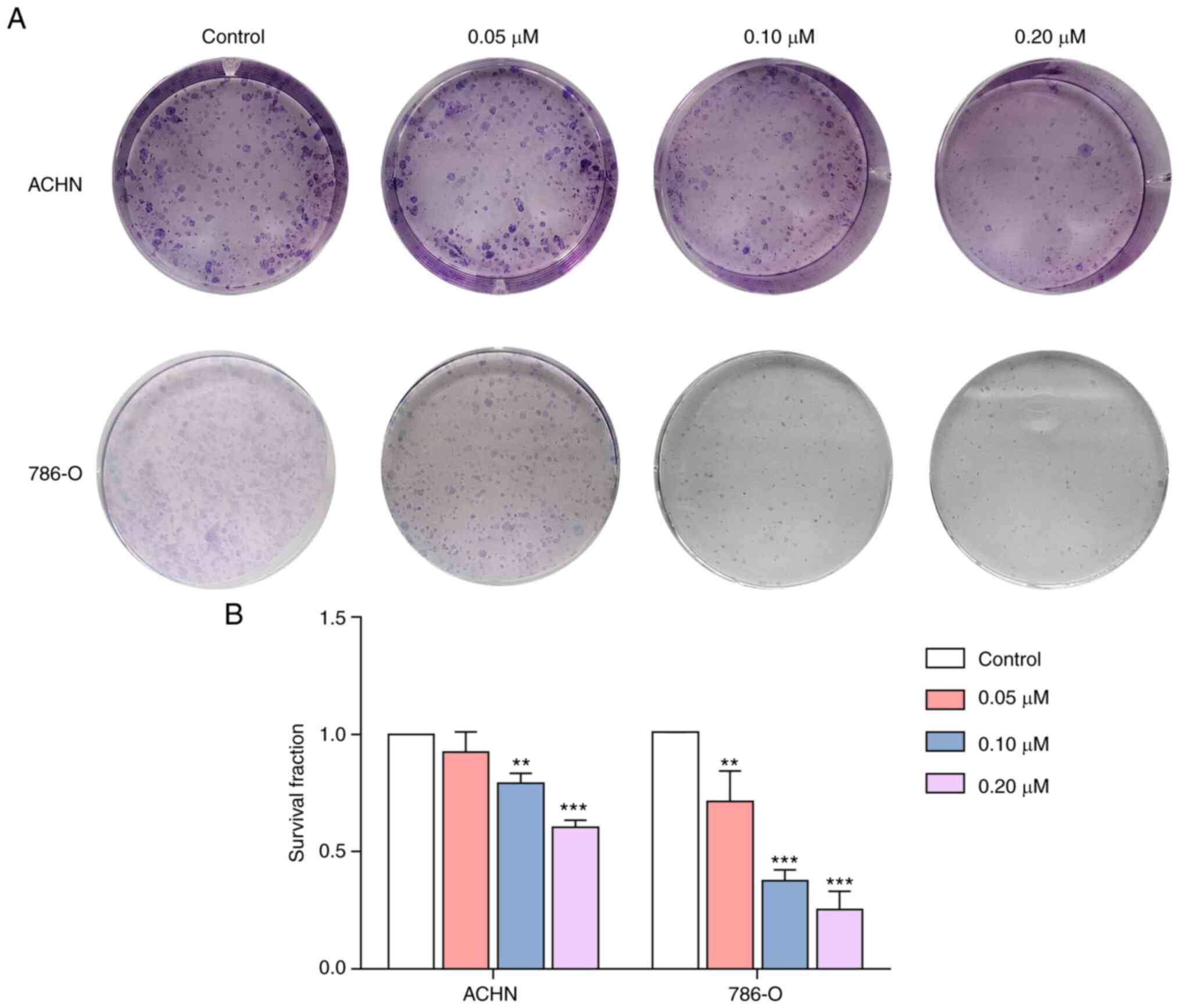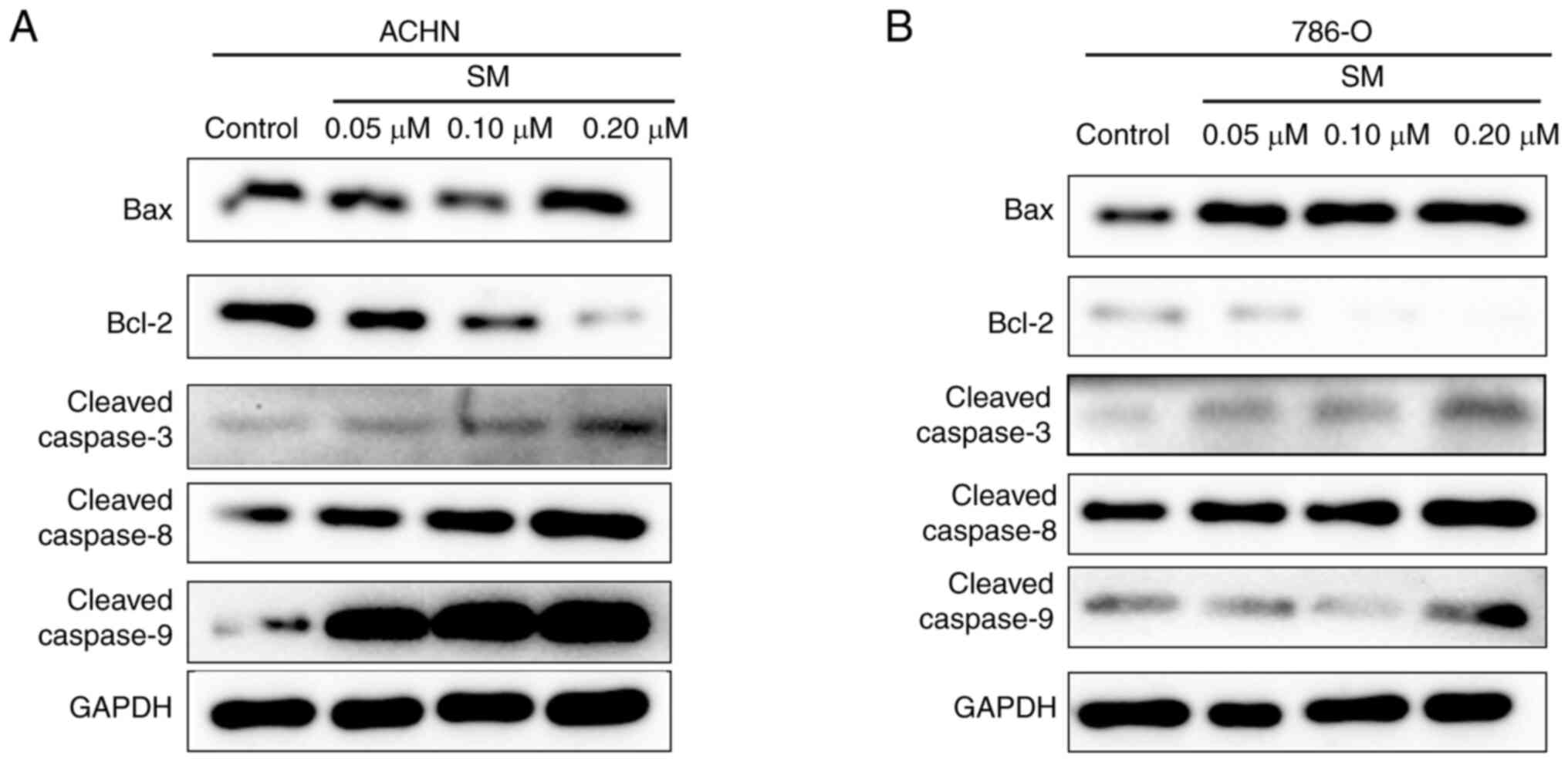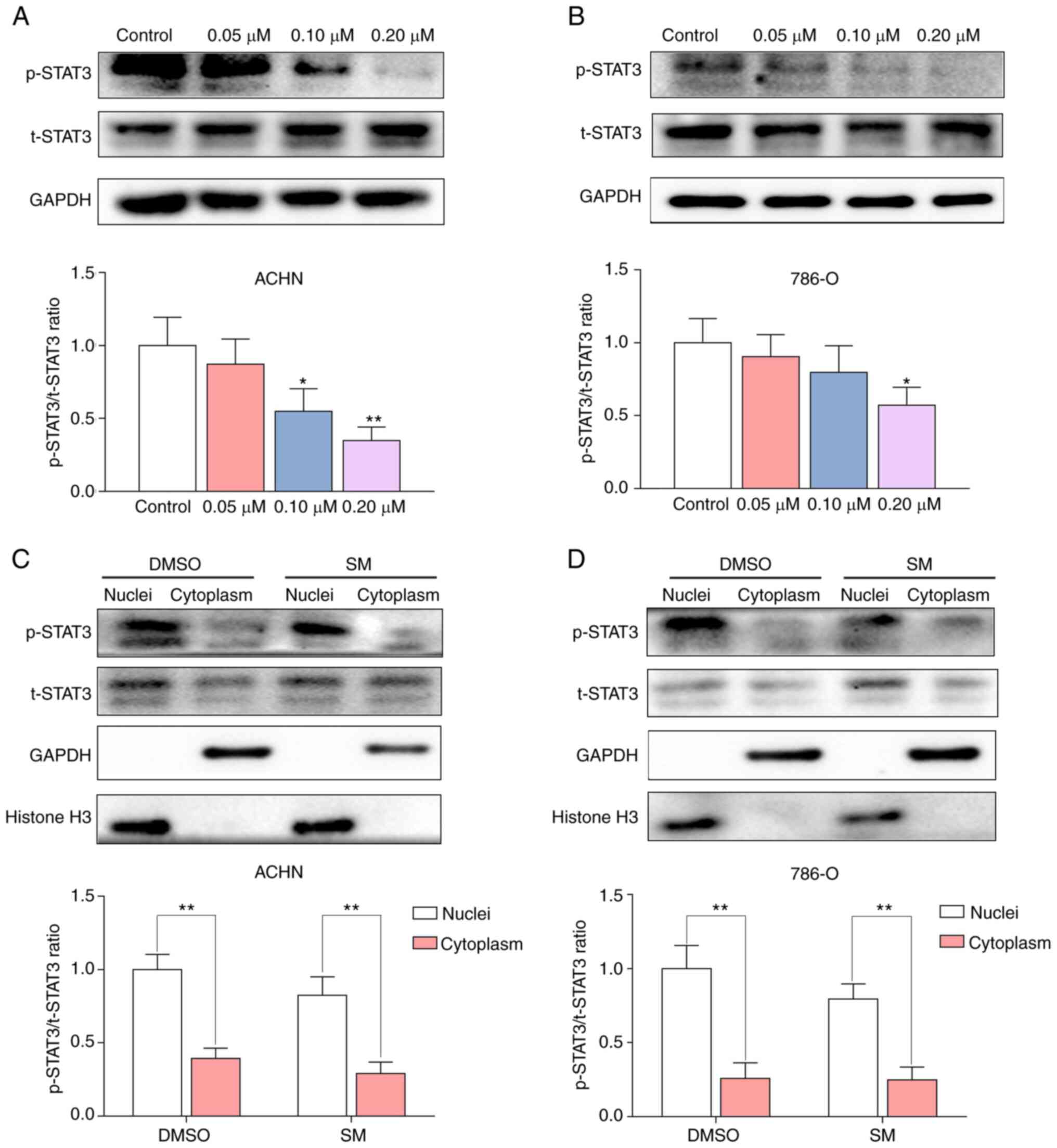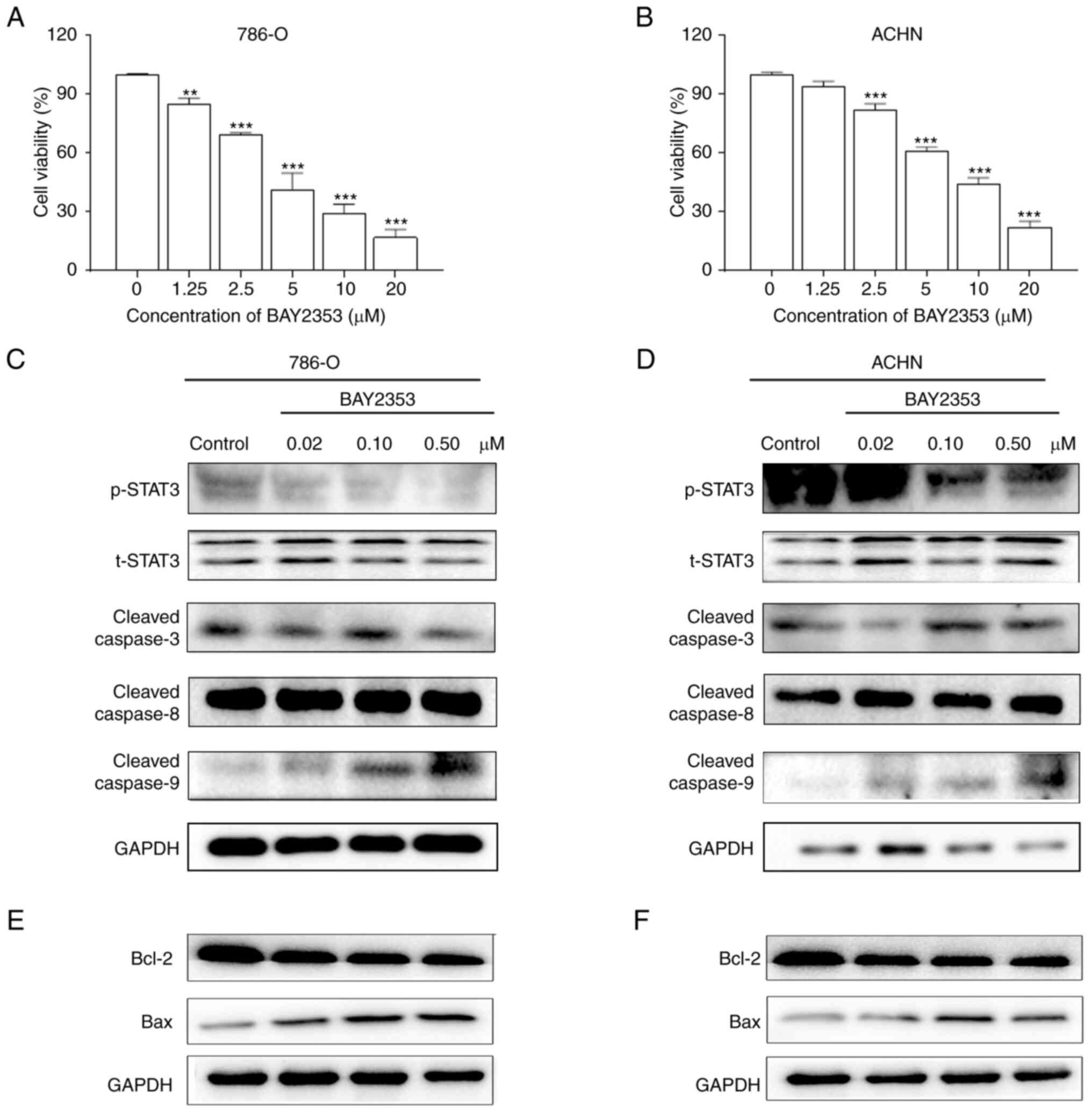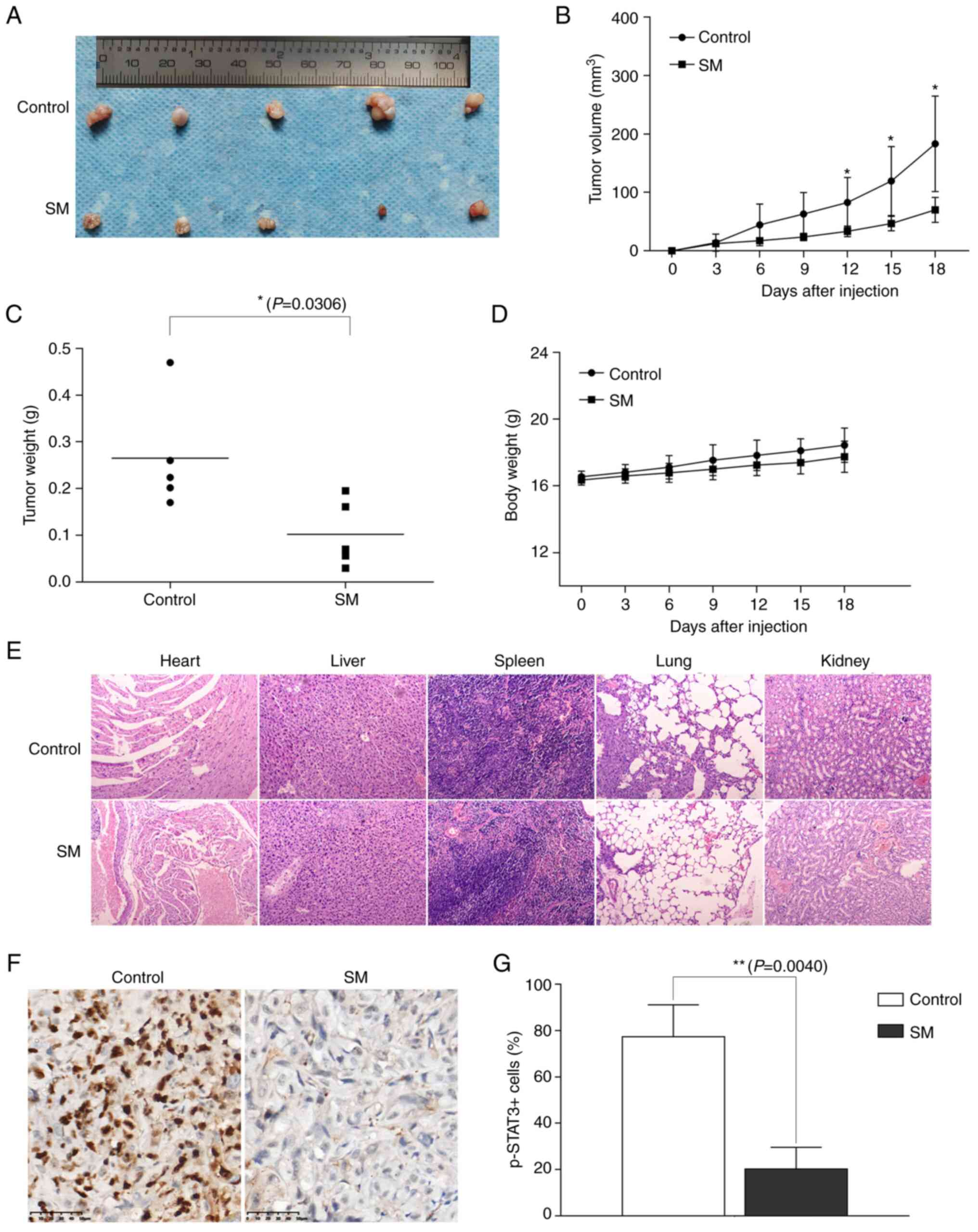|
1
|
Siegel RL, Miller KD and Jemal A: Cancer
statistics, 2020. CA Cancer J Clin. 70:7–30. 2020. View Article : Google Scholar : PubMed/NCBI
|
|
2
|
Capitanio U and Montorsi F: Renal cancer.
Lancet. 387:894–906. 2016. View Article : Google Scholar : PubMed/NCBI
|
|
3
|
Huang J, Wang X, Wen G and Ren Y:
miRNA2055p functions as a tumor suppressor by negatively regulating
VEGFA and PI3K/Akt/mTOR signaling in renal carcinoma cells. Oncol
Rep. 42:1677–1688. 2019.PubMed/NCBI
|
|
4
|
Hillmer EJ, Zhang H, Li HS and Watowich
SS: STAT3 signaling in immunity. Cytokine Growth Factor Rev.
31:1–15. 2016. View Article : Google Scholar : PubMed/NCBI
|
|
5
|
Sun Y, Liu L, Wang Y, He A, Hu H, Zhang J,
Han M and Huang Y: Curcumin inhibits the proliferation and invasion
of MG-63 cells through inactivation of the p-JAK2/p-STAT3 pathway.
Onco Targets Ther. 12:2011–2021. 2019. View Article : Google Scholar : PubMed/NCBI
|
|
6
|
Song M, Wang C, Yang H, Chen Y, Feng X, Li
B and Fan H: P-STAT3 inhibition activates endoplasmic reticulum
stress-induced splenocyte apoptosis in chronic stress. Front
Physiol. 11:6802020. View Article : Google Scholar : PubMed/NCBI
|
|
7
|
Tan B, Chen X, Fan Y, Yang Y, Yang J and
Tan L: STAT3 phosphorylation is required for the HepaCAM-mediated
inhibition of castration-resistant prostate cancer cell viability
and metastasis. Prostate. 81:603–611. 2021. View Article : Google Scholar : PubMed/NCBI
|
|
8
|
Zhang ZH, Li MY, Wang Z, Zuo HX, Wang JY,
Xing Y, Jin C, Xu G, Piao L, Piao H, et al: Convallatoxin promotes
apoptosis and inhibits proliferation and angiogenesis through
crosstalk between JAK2/STAT3 (T705) and mTOR/STAT3 (S727) signaling
pathways in colorectal cancer. Phytomedicine. 68:1531722020.
View Article : Google Scholar : PubMed/NCBI
|
|
9
|
Jahangiri A, Dadmanesh M and Ghorban K:
STAT3 inhibition reduced PD-L1 expression and enhanced antitumor
immune responses. J Cell Physiol. 235:9457–9463. 2020. View Article : Google Scholar : PubMed/NCBI
|
|
10
|
Lorente D, Arevalo J, Salcedo MT, Trilla
E, de Torres I, Meseguer A and Morote J: Analysis of the nuclear
expression of pSer727-STAT3 as a prognostic factor in patients with
clear cell renal carcinoma. Actas Urol Esp (Engl Ed). 44:245–250.
2020.(In English, Spanish). View Article : Google Scholar : PubMed/NCBI
|
|
11
|
Zhan C, Xu C, Chen J, Shen C, Li J, Wang
Z, Ying X, Luo Z, Ren Y, Wu G, et al: Development and Validation of
an IL6/JAK/STAT3-Related gene signature to predict overall survival
in clear cell renal cell carcinoma. Front Cell Dev Biol.
9:6869072021. View Article : Google Scholar : PubMed/NCBI
|
|
12
|
Arevalo J, Lorente D, Trilla E, Salcedo
MT, Morote J and Meseguer A: Nuclear and cytosolic pS727-STAT3
levels correlate with overall survival of patients affected by
clear cell renal cell carcinoma (ccRCC). Sci Rep. 11:69572021.
View Article : Google Scholar : PubMed/NCBI
|
|
13
|
Lorente D, Trilla E, Meseguer A, Arevalo
J, Nemours S, Planas J, Placer J, Celma A, Salvador C, Regis L, et
al: The role of STAT3 protein as a prognostic factor in the clear
cell renal carcinoma. Systematic review. Actas Urol Esp (Engl Ed).
43:118–123. 2019.(In English, Spanish). View Article : Google Scholar : PubMed/NCBI
|
|
14
|
Li S, Priceman SJ, Xin H, Zhang W, Deng J,
Liu Y, Huang J, Zhu W, Chen M, Hu W, et al: Icaritin inhibits
JAK/STAT3 signaling and growth of renal cell carcinoma. PLoS One.
8:e816572013. View Article : Google Scholar : PubMed/NCBI
|
|
15
|
Ge J, Wang P, Ma H and Zhang J:
Solamargine inhibits prostate cancer cell growth and enhances the
therapeutic efficacy of docetaxel via Akt signaling. J Oncol.
2022:90559542022. View Article : Google Scholar : PubMed/NCBI
|
|
16
|
Sani IK, Marashi SH and Kalalinia F:
Solamargine inhibits migration and invasion of human hepatocellular
carcinoma cells through down-regulation of matrix
metalloproteinases 2 and 9 expression and activity. Toxicol In
Vitro. 29:893–900. 2015. View Article : Google Scholar : PubMed/NCBI
|
|
17
|
Furtado RA, Ozelin SD, Ferreira NH, Miura
BA, Almeida Junior S, Magalhaes GM, Nassar EJ, Miranda MA, Bastos
JK and Tavares DC: Antitumor activity of solamargine in mouse
melanoma model: Relevance to clinical safety. J Toxicol Environ
Health A. 85:131–142. 2022. View Article : Google Scholar : PubMed/NCBI
|
|
18
|
Wu YH, Chiu WT, Young MJ, Chang TH, Huang
YF and Chou CY: Solanum Incanum extract downregulates aldehyde
dehydrogenase 1-mediated stemness and inhibits tumor formation in
ovarian cancer cells. J Cancer. 6:1011–1019. 2015. View Article : Google Scholar : PubMed/NCBI
|
|
19
|
Al Chami L, Mendez R, Chataing B,
O'Callaghan J, Usubillaga A and Lacruz L: Toxicological effects of
alpha-solamargine in experimental animals. Phytother Res.
17:254–258. 2003. View
Article : Google Scholar : PubMed/NCBI
|
|
20
|
Sezer ED, Oktay LM, Karadadas E, Memmedov
H, Selvi Gunel N and Sozmen E: Assessing anticancer potential of
blueberry flavonoids, quercetin, kaempferol, and gentisic acid,
through oxidative stress and apoptosis parameters on HCT-116 cells.
J Med Food. 22:1118–1126. 2019. View Article : Google Scholar : PubMed/NCBI
|
|
21
|
Wang HQ, Man QW, Huo FY, Gao X, Lin H, Li
SR, Wang J, Su FC, Cai L, Shi Y, et al: STAT3 pathway in cancers:
Past, present, and future. MedComm (2020). 3:e1242022.PubMed/NCBI
|
|
22
|
Fan M, Sun W, Gu X, Lu S, Shen Q, Liu X
and Zhang X: The critical role of STAT3 in biogenesis of
tumor-derived exosomes with potency of inducing cancer cachexia in
vitro and in vivo. Oncogene. 41:1050–1062. 2022. View Article : Google Scholar : PubMed/NCBI
|
|
23
|
Qin JJ, Yan L, Zhang J and Zhang WD: STAT3
as a potential therapeutic target in triple negative breast cancer:
A systematic review. J Exp Clin Cancer Res. 38:1952019. View Article : Google Scholar : PubMed/NCBI
|
|
24
|
Liu Y, Liao S, Bennett S, Tang H, Song D,
Wood D, Zhan X and Xu J: STAT3 and its targeting inhibitors in
osteosarcoma. Cell Prolif. 54:e129742021. View Article : Google Scholar : PubMed/NCBI
|
|
25
|
Yang J, Ren Y, Lou ZG, Wan X, Weng GB and
Cen D: Paeoniflorin inhibits the growth of bladder carcinoma via
deactivation of STAT3. Acta Pharm. 68:211–222. 2018. View Article : Google Scholar : PubMed/NCBI
|
|
26
|
Deleuze A, Saout J, Dugay F, Peyronnet B,
Mathieu R, Verhoest G, Bensalah K, Crouzet L, Laguerre B,
Belaud-Rotureau MA, et al: Immunotherapy in Renal cell carcinoma:
The future is now. Int J Mol Sci. 21:25322020. View Article : Google Scholar : PubMed/NCBI
|
|
27
|
Islam MR, Akash S, Rahman MM, Nowrin FT,
Akter T, Shohag S, Rauf A, Aljohani ASM and Simal-Gandara J: Colon
cancer and colorectal cancer: Prevention and treatment by potential
natural products. Chem Biol Interact. 368:1101702022. View Article : Google Scholar : PubMed/NCBI
|
|
28
|
Shams Ul Hassan S, Ishaq M, Zhang WD and
Jin HZ: An overview of the mechanisms of marine fungi-derived
anti-inflammatory and anti-tumor agents and their novel role in
drug targeting. Curr Pharm Des. 27:2605–2614. 2021. View Article : Google Scholar : PubMed/NCBI
|
|
29
|
Su M, Qin B, Liu F, Chen Y and Zhang R:
Andrographolide enhanced 5-fluorouracil-induced antitumor effect in
colorectal cancer via inhibition of c-MET pathway. Drug Des Devel
Ther. 11:3333–3341. 2017. View Article : Google Scholar : PubMed/NCBI
|
|
30
|
Fu R, Wang X, Hu Y, Du H, Dong B, Ao S,
Zhang L, Sun Z, Zhang L, Lv G and Ji J: Solamargine inhibits
gastric cancer progression by regulating the expression of
lncNEAT1_2 via the MAPK signaling pathway. Int J Oncol.
54:1545–1554. 2019.PubMed/NCBI
|
|
31
|
Xie X, Zhu H, Yang H, Huang W, Wu Y, Wang
Y, Luo Y, Wang D and Shao G: Solamargine triggers hepatoma cell
death through apoptosis. Oncol Lett. 10:168–174. 2015. View Article : Google Scholar : PubMed/NCBI
|
|
32
|
Porubsky M, Reznickova E, Krupkova S,
Krystof V and Hlavac J: Development of fluorescent dual-FRET probe
for simultaneous detection of caspase-8 and caspase-9 activities
and their relative quantification. Bioorg Chem. 129:1061512022.
View Article : Google Scholar : PubMed/NCBI
|
|
33
|
Mcglorthan L, Paucarmayta A, Casablanca Y,
Maxwell GL and Syed V: Progesterone induces apoptosis by activation
of caspase-8 and calcitriol via activation of caspase-9 pathways in
ovarian and endometrial cancer cells in vitro. Apoptosis.
26:184–194. 2021. View Article : Google Scholar : PubMed/NCBI
|
|
34
|
Goldar S, Khaniani MS, Derakhshan SM and
Baradaran B: Molecular mechanisms of apoptosis and roles in cancer
development and treatment. Asian Pac J Cancer Prev. 16:2129–2144.
2015. View Article : Google Scholar : PubMed/NCBI
|
|
35
|
Jin Z and El-Deiry WS: Overview of cell
death signaling pathways. Cancer Biol Ther. 4:139–163. 2005.
View Article : Google Scholar : PubMed/NCBI
|
|
36
|
Liang CH, Liu LF, Shiu LY, Huang YS, Chang
LC and Kuo KW: Action of solamargine on TNFs and
cisplatin-resistant human lung cancer cells. Biochem Biophys Res
Commun. 322:751–758. 2004. View Article : Google Scholar : PubMed/NCBI
|
|
37
|
Zhang X, Yan Z, Xu T, An Z, Chen W, Wang
X, Huang M and Zhu F: Solamargine derived from Solanum nigrum
induces apoptosis of human cholangiocarcinoma QBC939 cells. Oncol
Lett. 15:6329–6335. 2018.PubMed/NCBI
|
|
38
|
Liu J, Wang Z, Xu C, Qi Y and Zhang Q:
Solamargine inhibits proliferation and promotes apoptosis of CM-319
human chordoma cells through suppression of notch pathway. Transl
Cancer Res. 8:509–519. 2019. View Article : Google Scholar : PubMed/NCBI
|
|
39
|
Zhou Y, Tang Q, Zhao S, Zhang F, Li L, Wu
W, Wang Z and Hann S: Targeting signal transducer and activator of
transcription 3 contributes to the solamargine-inhibited growth and
-induced apoptosis of human lung cancer cells. Tumour Biol.
35:8169–8178. 2014. View Article : Google Scholar : PubMed/NCBI
|
|
40
|
Mohassab AM, Hassan HA, Abdelhamid D and
Abdel-Aziz M: STAT3 transcription factor as target for anti-cancer
therapy. Pharmacol Rep. 72:1101–1124. 2020. View Article : Google Scholar : PubMed/NCBI
|
|
41
|
Fathi N, Rashidi G, Khodadadi A, Shahi S
and Sharifi S: STAT3 and apoptosis challenges in cancer. Int J Biol
Macromol. 117:993–1001. 2018. View Article : Google Scholar : PubMed/NCBI
|
















